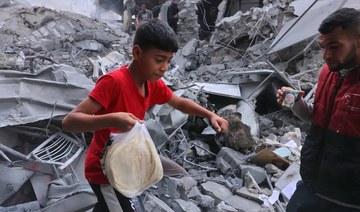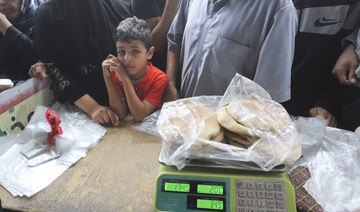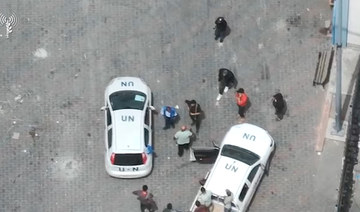NEW YORK CITY: Almost the entire population of Gaza risks “sliding into hunger hell” unless fuel deliveries are allowed to resume and there is a rapid increase in food supplies, an official from the UN’s World Food Programme warned on Thursday.
It came as the UN said 2.2 million Palestinians in the territory now need food aid to survive. The WFP said that with “winter fast approaching and unsafe and overcrowded shelters that lack clean water, people are facing the immediate possibility of starvation.”
Abeer Etefa, the WFP’s senior regional communications officer for the Middle East and North Africa region, said: “The collapse of food supply chains is a catastrophic turning point in an already very dire situation. Gaza was not an easy place to live in before Oct. 7, and if the situation was better before this conflict, it’s now disastrous.”
Palestinians in the Gaza Strip are growing increasingly desperate in their attempts to obtain bread and other essential food supplies, and cases of dehydration and malnutrition are rapidly increasing “by the day,” she added.
People are lucky if they have one meal a day and their options are mostly limited to canned food, said Etefa, “if it is actually available.”
Although aid trucks are “trickling into Gaza,” it is proving difficult to get the small amounts of food and water that cross the border to those in need because roads have been damaged by the war and fuel is in very short supply as a result of the Israeli blockade.
“The existing food systems in Gaza are collapsing,” Etefa said. “Food production has come to an almost complete halt. Markets have collapsed, fishermen cannot access the sea, farmers cannot reach their farms and the last bakery that the WFP has been working with has closed its doors because of the shortage of fuel.
“Shops have run out of food supplies. The bakeries are unable to operate because of the fuel and clean water shortages, or because they have sustained damage. The last remaining mill has also been hit and stopped operating.”
There were 130 bakeries in Gaza before the war. Eleven of them are known to have been been hit by airstrikes. Others closed after running out of fuel. As a result, supplies of bread, a staple food for Gazans, have dried up.
The WFP was also forced to shut down a local program that since the start of the war had been providing fresh bread for 200,000 Palestinians living in shelters.
With gas and electricity in desperately short supply, Etefa said people have been burning wood to cook or bake. Perishable food is “not really an option at all” because there is no power for refrigerators.
Local markets have shut down completely, only about 25 percent of shops in Gaza remain open and those that do have very limited stock, she added. Small quantities of food can sometimes be found but it is sold “at alarmingly inflated prices” and is of little use without fuel and gas to provide the power to cook it.
“That’s forcing people to survive on maybe one meal a day, if they are lucky to find this meal,” said Etefa. “And for the lucky ones, this meal will include maybe canned food. Some people have actually resorted to consuming raw onions, uncooked eggplant, whatever they can get their hands on.”
The trickle of humanitarian aid that is arriving in Gaza does not come close to making up for the lack of commercial food imports, she added. Of the 1,129 trucks that have entered Gaza since the Rafah crossing on the border with Egypt reopened on Oct. 21, only 447 were carrying food supplies.
Before the war, more than 400 trucks a day arrived in Gaza carrying supplies essential to the survival of the population. That number has fallen to fewer than 100 a day, and the food that they carry meets only about 7 percent of the population’s daily minimum caloric needs.
Etefa called for an increase in the number of trucks carrying food to Gaza, the opening of additional border crossings, safe routes for humanitarian workers to distribute aid, and deliveries of fuel to bakeries so that they can resume production of bread.
Juliette Touma of the Relief and Works Agency for Palestine Refugees in the Near East said the absence of fuel to power generators is also causing a communications blackout in Gaza, as a result of which there would be no cross-border aid operation at the Rafah crossing on Friday.
“It has been almost six weeks (of) total disregard for international humanitarian law,” she said. “Today, Gaza looks like it’s been hit by an earthquake, except it’s man-made and it could have been totally avoided.
“We have just witnessed in the past week the largest displacement of Palestinians since 1948. This was an exodus, under our watch, of people being forced to flee their homes. Some were forced to relive the unlivable traumas from the past, mostly unhealed.”
Touma added that “the dignity of people has been stripped overnight. Children in the shelters are pleading for a sip of water and a piece of bread. People are telling us they must queue for two-to-three hours just to go to the toilet. They share one toilet with hundreds of others. All of this brings us back to the medieval age.”
A ceasefire is required “now, if we want to save whatever is left of our humanity. In fact it’s long overdue,” she said.
She also pleaded for fuel to be delivered “without any conditions or delays” so that humanitarian operations across the Gaza Strip can continue.
“Anything less than our minimum needs would be cruel,” said Touma. “Without it, 2 million people will be deprived of services and humanitarian assistance. The siege on Gaza must be lifted.”





























